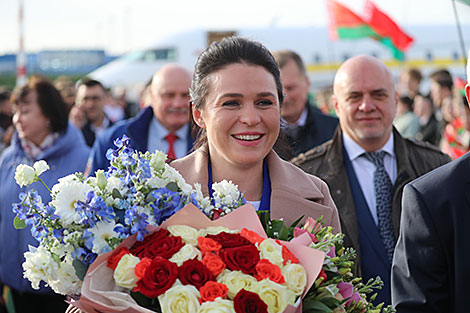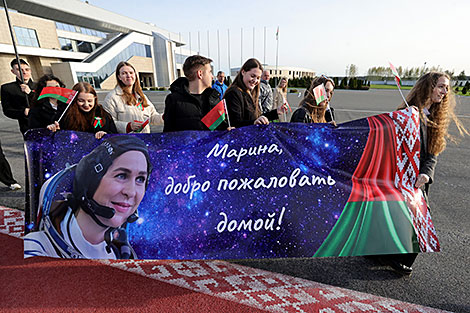Opinions & Interviews
Belarus’ first cosmonaut returns home

MINSK, 11 April (BelTA) - Marina Vasilevskaya, the first cosmonaut of sovereign Belarus, has returned home. A plane with her onboard landed at Minsk National Airport on 11 April, BelTA has learned.
Marina Vasilevskaya had spent the last five days in the Zvyozdny Gorodok undergoing a post flight reconditioning program, and today she came home to a warm welcome of several dozen representatives of public associations, students and journalists.
“When the launch took place and Marina flew into space, we were overwhelmed with emotion. We tried to soak up the moment to keep it in our memory, although we did not fully understand the historical significance of the event. Only when we flew home, we realized that we had become a part of history. Today, we are again having a moment greeting Marina Vasilevskaya home. It is a great honor to meet the first Belarusian cosmonaut at home, in her native land,” said Nadezhda Tovstik, a student of BNTU, the winner of the Miss Minsk 2023 contest.





The girls, who accompanied Marina Vasilevskaya at different stages in the process of preparation for the spaceflight, were especially excited before greeting Marina back. Viktoriya Fidrus, a flight attendant of Belavia, participated in the selection for the flight into space. It is both exciting and honorable for her to meet the first Belarusian cosmonaut today. “We passed the medical commission together, and since then we started to fly together and in general began to spend a lot of time together, keeping in touch,” Viktoriya said.
“Marina did really well! We are all happy to see her back in Belarus,” remarks Anastasiya Lenkova, a space flight candidate, said.
The date for the first cosmonaut of sovereign Belarus to return home was announced by Chief Academic Secretary of the National Academy of Sciences of Belarus Vasily Gursky on 10 April. Marina Vasilevskaya has come home following a 14-day spaceflight. 12 days of the flight she spent aboard the International Space Station (ISS). While on the ISS Marina Vasilevskaya carried out a research program, which had been developed by the National Academy of Sciences of Belarus in association with Roscosmos and the Russian Academy of Sciences.







 print version
print version make home page
make home page add to bookmarks
add to bookmarks

